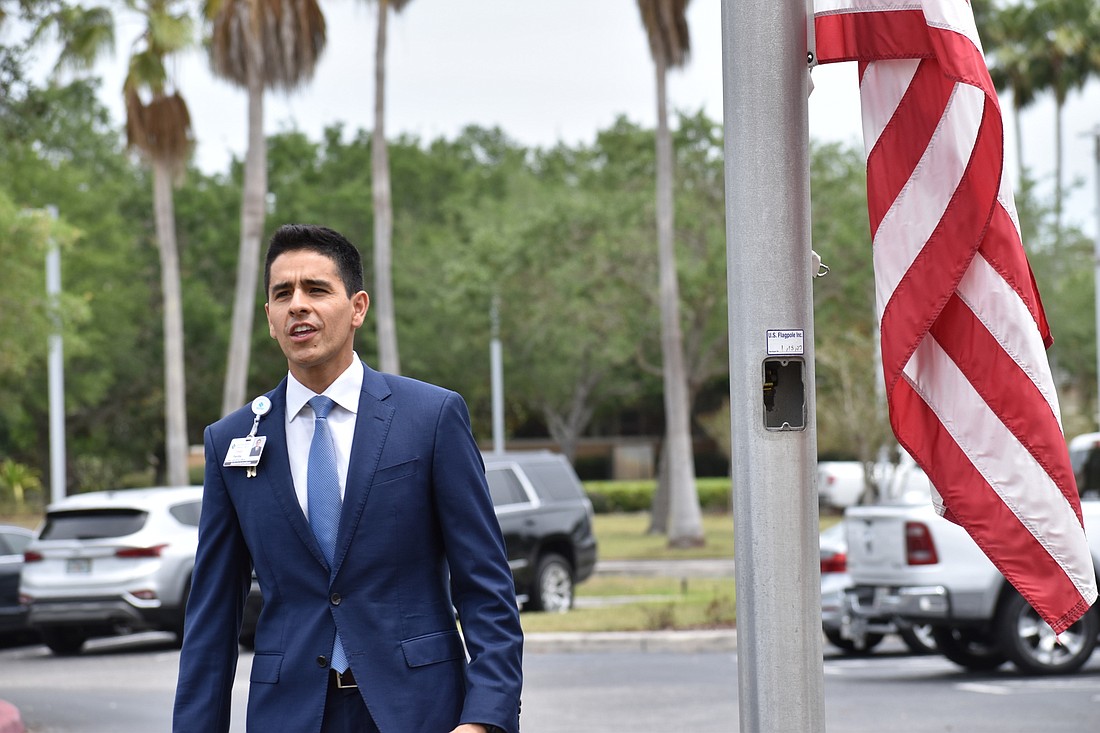- April 9, 2025
-
-
Loading

Loading

At exactly 1:08 p.m. April 18, heart transplant recipient Gary Rosenbaum raised the Donate Life flag at Lakewood Ranch Medical Center as many of the hospital's staff members took a break to watch the ceremony.
The event was held in honor of Donate Life Month, an initiative of Donate Life America, and initiated by member organization LifeLink Foundation. It marked the first year Lakewood Ranch Medical Center engaged in the ceremony, which has been performed at hospitals in increasing numbers around the country.
“One donor can impact or save eight lives,” said Diego Perilla, the chief operating officer of Lakewood Ranch Medical Center, in reference to the donation of various organs. He explained that as a result, the center chose a date and time that included those numbers.
“It sends shivers down your spine,” Venice's Rosenbaum said about serving as the flag-raiser.
Rosenbaum said he thinks about how thankful he is for his donated heart every day.
Judy Young, the chief nursing officer at Lakewood Ranch Medical Center, said the hospital was honored to host the flag-raising ceremony in order to recognize those who have donated organs.
"We feel it is important to bring community awareness to the need for organ donors and the life-saving results of those decisions."
Perilla said that over the past five years, the hospital has saved six lives through organ donation.
Hospital Development Specialist and Sarasota resident Jennifer Miller, who represented LifeLink at the event, said a hospital of that size typically only receives one to two donors per year. She noted Sarasota Memorial Hospital, the largest hospital in the area, received 18 donors last year.
“Many people are very surprised to hear how low it is,” she said.
As Gary Rosenbaum stepped up to the flagpole, he gave a speech recounting his emotional journey as a heart transplant recipient, highlighting the significance of the hospital's donors.
As a businessman in Maryland, Rosenbaum led an active and healthy life as a bicyclist, kayaker and hiker. However, shortly after retirement, he began experiencing extreme tiredness. At first, doctors thought his condition was arrhythmia, but when it was later diagnosed it as severe right side heart failure, Rosenbaum was told he would require a heart transplant in five years.
“At that moment,” he said, “it hit me pretty hard: When they asked me to be an organ donor at the Department of Motor Vehicle Administration, this was the reason.”
Using mediations and therapy, Rosenbaum was still able to perform simpler physical activities before his condition deteriorated further.
In 2015, he was admitted to the University of Pennsylvania's heart transplant program and placed on a waiting list, eventually receiving 1A status, the designation for patients with a life expectancy of a week or less without a transplant.
On Christmas Eve, doctors finally announced that a match had been found.
“All the emotions that go with that were hitting me,” said Rosenbaum. “Why does someone need to die for me to receive a heart? Why do I deserve a donor's heart? What are the chances that I might survive the surgery? What are the chances I'll reject my heart? What would life be like after my transplant? And that my donor family lost a loved one on Christmas Eve.”
After saying goodbye to his wife and daughter — just in case — he was wheeled to the operating room while a Santa Claus stood in the hallway and people sang Christmas carols.
He woke up in the ICU two days later, and although he had “major complications,” he was released within 14 days.
Rosenbaum describes himself today as “maybe stronger than I ever was.”
He has returned to cycling and is president of the local Cruisers Club and an athlete at the Transplant Games, an Olympic-style competition for transplant recipients. He attended the games in Málaga, Spain, in 2017; Salt Lake City in 2018; and Newcastle, England, in 2019. And he plans to attend them in San Diego this year.
“It’s just incredible,” he said. “You walk into the stadium during the opening ceremonies, and there’s 14,000 or 15,000 donor recipients. You look around and think, if it wasn’t for organ donors, we all wouldn’t be here. And the applause is earth-shattering.”
He also said the athletics themselves are impressive. “When I sit in the stadium and watch the games, I think these people are not hurting at all. You’d think they were Olympic-level athletes.”
Rosenbaum said that during COVID-19, he was sure to let his donor family know he was taking care of his donor’s heart. “I was extra careful to make sure he would survive, that I would survive,” said Rosenbaum.
“It's really exciting to see that more hospitals are participating in these flag raisings,” said Ashley Moore, manager of public affairs for LifeLink Foundation, and chair for Donate Life Florida. “The support for donation has really grown. And we've seen that at Lifelink with record donor numbers last year, as well as across the country.”
Before raising the flag to the position where it remained after the ceremony, Rosenbaum said: “I’d like to thank the Lakewood Ranch Medical Center for all you do in the field of organ donation and procurement. Without you, people like me wouldn't be here now — so thank you.”